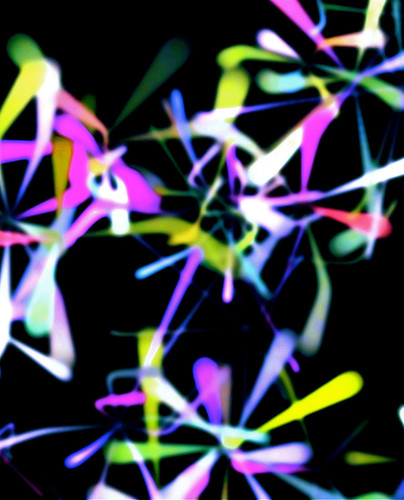Monday, 6:01pm
22 February 2010
Discussing the digital
John Maeda on dirt, de-cluttering and the power of art

Even though John Maeda wasn’t officially speaking at the ‘Decoding the Digital’ conference, staged alongside the exhibition ‘Decode: Digital Design Sensations’, his work and words (from a lecture earlier in that week) were referenced during the proceedings, writes Liz Farrelly.
That Maeda’s computer-generated, algorithmic film ‘Nature’ features in the exhibition (on until 11 April), and that he is President of the Rhode Island School of Design (RISD), which actually offers 50/50 design and fine art courses, made his appearance doubly relevant to a conference where algorithms (the generation of images via computer code) became the ‘default’ dominate leitmotif, and the art and design divide felt wider than ever.
Above: John Maeda, Nature (2007).
Maeda was witty and inspirational while suggesting that we could all benefit from a mental de-cluttering (see The Laws of Simplicity, MIT Press, 2006). He also proclaimed that art and design will save the economy, if we convince business leaders that divergent thinking is more useful than trying to convert every idea into a product line; S.T.E.M (science, technology, engineering, maths), the mantra of education and commerce, should become S.T.E.A.M, with the addition of art.
He uses word games, finding significant acronyms to add a little mysticism to his decision making process. He also advocated dirt, chance and failure, revealing that when he shows images of art students’ inked up hands at conferences, computer geeks in the audience assail him with pleas of ‘we want to get dirty too’. Finally, Maeda reminded us that, ‘artists aren’t afraid to fail’, because, of course, that’s how we learn.
See ‘Electric Narcissus and digital Echo’ and ‘20-20 Digital Hindsight’ on the Eye blog, and read Aaron Seymour’s review of John Maeda’s The Laws of Simplicity in Eye 62. More about ‘Decoding the Digital’ later this week.
Eye, the international review of graphic design, is a quarterly journal you can read like a magazine and collect like a book. It’s available from all good design bookshops and at the online Eye shop, where you can order subscriptions, single issues and classic collections of themed back issues. Eye 74 features a Reputations interview with Karsten Schmidt, whose work is featured in ‘Decode’ and in its promotional posters and animations.

